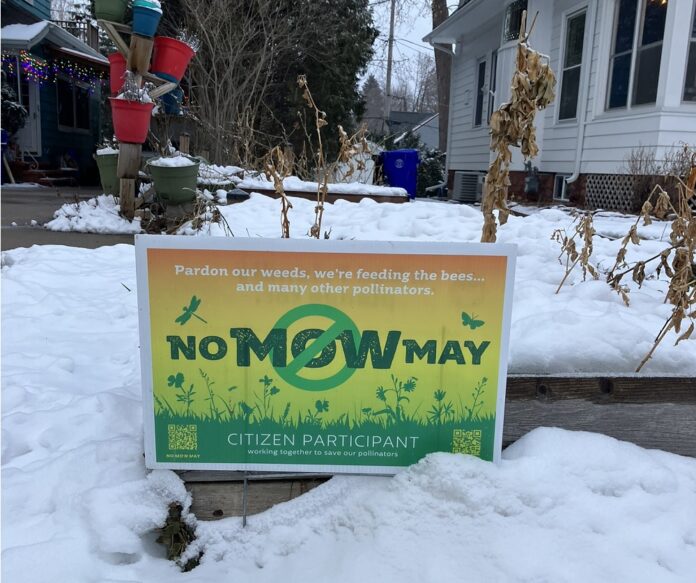Duke Behnke | Appleton Post-Crescent USA TODAY NETWORK – WISCONSIN
APPLETON – An alderman’s effort to nix No Mow May in Appleton was rejected Monday but not before he was sharply criticized for his actions.
Common Council member Chad Doran introduced a resolution to eliminate No Mow May, claiming the program “doesn’t have any scientific backing behind it.” His colleagues on the Municipal Services Committee denied the resolution on a 4-1 vote, with Doran dissenting.
Council member Brad Firkus said Doran’s resolution intentionally omitted “that bee populations were stronger where there was no mowing.”
“The fact that you would know that information, omit that information and submit this resolution makes it inconceivable that this resolution’s primary impetus is about No Mow May to even begin with,” Firkus said. “I think that this is an entirely inappropriate use of the powers we have as an alderperson.”
Doran’s resolution also drew rebukes from Israel Del Toro and Relena Ribbons, two assistant professors at Lawrence University who are studying the effects of No Mow May. They viewed the resolution as an attack on their professional work.
“It’s a form of bullying,” Ribbons said. “I understand that perhaps that’s allowed in the political realm, but there’s no space for that in science. There’s no space for bullying in Appleton. We’re not that kind of community.”
No Mow May lets property owners delay lawn care during May as a way to promote the maturation of flowering plants that provide food for bees and other pollinators early in the growing season. Participation is voluntary.
The program was started on a trial basis in 2020 and 2021. Appleton made it an annual fixture in 2022, when the council voted 10-4 to adopt No Mow May as an ordinance. Doran was a dissenting vote at that time, too.
Doran’s resolution says Appleton adopted No Mow May based largely on a study by Del Toro and Ribbons that showed increases in bee abundance and bee diversity in No Mow May lawns compared to nearby parkland that was mowed regularly.
The study was retracted in November by the authors and editorial team “after finding several potential inconsistencies in data handling and reporting,” leading Doran to conclude that the science was unreliable.
“When we do an ordinance, we have to have some level of data behind it, be it scientific or otherwise, and not just because we think something might feel good or we think it might have some sort of benefit,” Doran said. “That’s not a reason to have an ordinance in place.”
Del Toro, a fellow council member and a strong proponent of No Mow May, said the study was retracted after reviewers were critical of comparing residential lawns to nearby parkland and of identifying bee species by sight, when it oftentimes requires laboratory equipment.
The study was replicated to compare No Mow May lawns and mown lawns and to improve the identification of bee species, Del Toro said, and the data confirmed and strengthened the benefits of No Mow May. He said the new results will be published soon.
“Not mowing your lawn and letting things come to flower actually does increase the abundance and diversity of pollinating insects,” Del Toro told The Post-Crescent.
Del Toro and Ribbons were frustrated with Doran’s tactics. They said Doran didn’t reach out to discuss the study before introducing his resolution to kill the program.
“I think Chad’s just trying to make an issue where there isn’t one and just bring attention to himself,” Del Toro said.
Before the committee’s vote, residents urged Appleton to continue No Mow May.
“No Mow May is something that makes me really proud of Appleton and proud to be from here,” Laney McKee French said.
“We have participated as a family in No Mow May ever since it started,” Linda Sheffler said. “It’s a great, easy way to impact our local environment. It helps pollinators, who are in trouble. No one is forced to not mow. There’s no cost to it.”
Appleton was the first city in the U.S. to adopt No Mow May. It was joined last year by more than 20 Wisconsin communities, including De Pere, Fox Crossing, Green Bay, Hortonville, Kaukauna, New Holstein, Oshkosh, Stevens Point, Wausau and Wisconsin Rapids.
Registration for No Mow May can be done online through Pollenablers-Fox Cities at www.BYOBeez.org/NoMow-May.
Contact Duke Behnke at 920-9937176 or dbehnke@


